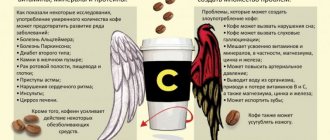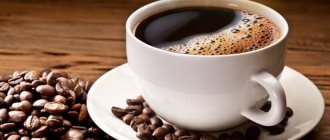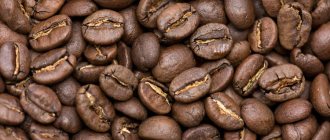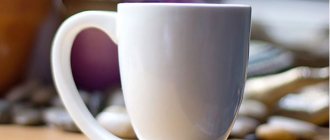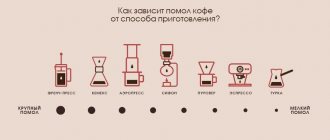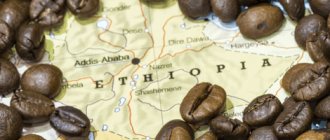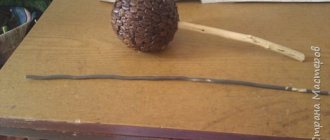How drinking tea or coffee causes heart pain
Each heart cell has a certain balance of enzymes.
The intrusion of theine into biochemical processes upsets the balance, causing inhibition of the activity of the enzyme phosphodiesterase, which destroys cAMP and cGMP, as a result of which the level of the latter increases and gives an effect similar to the action of adrenaline: increased heart rate, increased force of contraction of the heart muscle. Due to phosphodiesterase inhibition, the transport of calcium ions is disrupted. Muscle fibers contract under their action, and with an increase in calcium ions, spasm of the heart vessels is possible. Due to vasoconstriction (narrowing of the lumen of blood vessels), blood flow decreases, which leads to the accumulation of toxins that excite nerve endings, and this is interpreted by us as “heart pain” or cardialgia.
It is mistakenly believed that theine increases blood pressure. Israeli scientists claim the opposite: during the experiment they proved that the indicators increase no more than 4-6 mmHg. Art.
Based on the above, they say that coffee hurts the heart. The pain is short-term, pressing, with low intensity, localized behind the sternum. With moderate consumption of the drink, the effect is positive, but a prolonged increase in guaranine in the blood leads to decompensation and exhaustion and, as a result, cardialgia with symptoms of irritability, insomnia and neurocirculatory dystonia.
The fact of the physiological feature of increased sensitivity to theine indicates that even a slight increase in this substance in the body leads to hyperesthesia. This situation is associated with genetic predisposition, age or other morphofunctional characteristics of a person.
People with sensitive psyches also react sharply to increased levels of guaranine. In these individuals, an overdose of active substances is manifested by tachycardia or painful sensations in the heart area.
Coronary heart disease and coffee
Not only coffee, but also chocolate increases the risk of heart attack due to cardiac ischemia. This means you need to give up coffee. If coffee consumption was unsystematic and abuse occurred, then first of all you need to establish a diet for drinking caffeine-containing drinks. And then abandon them altogether.
The fact is that ischemia is a constant disturbance of the heart rhythm due to thickening of the blood and portioned flow to the ventricles. Stimulation of the heart to increase or decrease the rhythm is not allowed. Therefore, coffee is prohibited, as are painkillers, which slow down the heart.
Tactics and precautions
If you notice similar symptoms in yourself, follow this algorithm of actions:
- Stop drinking coffee . When complaints appear repeatedly, discard the etiological factor, or at least reduce the amount of drink.
- Add milk or cream . They bind guaranine, which reduces its effect on the body.
- Eat more vegetables and fruits . They will enrich the body with vitamins and microelements and remove toxins through their conjugation. Dark-colored berries (blueberries, blackberries, currants) replenish vitamin reserves, nourish the heart muscle, and increase the level of hemoglobin in the blood. And this improves the rheological characteristics, diluting the latter, which directly affects the detoxification process.
- If you feel pain in your heart after drinking strong tea, which does not go away for a long period or causes attacks of fear, consult a doctor . In such a case, the drink plays the role of a marker, revealing hidden problems with the heart or autonomic nervous system. The doctor will conduct the necessary diagnostics and prescribe appropriate treatment, which will help you recover quickly.
Don't forget, the heart is a pump that is regulated by both the endocrine and nervous systems. So keep them in good shape:
- go in for sports (if there are no contraindications), take a walk;
- perform general strengthening procedures;
- positive emotions and good mood will help people with a sensitive psyche;
- get rid of bad habits.
Is coffee harmful to the heart?
The harm of coffee is associated only with its excessive consumption. Being a psychostimulant, caffeine contained in coffee drinks can cause:
- Increased nervous background.
- Loss of strength after a sharp surge in activity.
- Skin rashes.
- Temporary sexual dysfunction.
- Rapid heartbeat
- Increased heart rate.
Can heart patients drink coffee?
You can use it, but with a number of reservations. First of all, when being examined by a cardiologist and identifying heart problems, the patient is asked about his preferences in drinking that drink. The permissible dose is specified for various categories of cores:
- Mild, intermittent arrhythmia - 85 to 100 mg . caffeine or 1-2 cups of medium-strong coffee per day.
- Persistent arrhythmia - from 40 to 65 mg of caffeine or 1 cup of strong coffee or 2 weak ones per day.
- Cardiac ischemia and tendency to heart attack - it is advisable to give up coffee altogether, since one-time use will lead to a “response” of the heart to the effects of caffeine.
If, with arrhythmia or hypertension, periodic attacks of the disease occur that are difficult to predict, then the permitted dose is prohibited to the patient.
What kind of coffee can heart patients drink?
The best answer is no. But what to do if you really want to? It is better to select varieties of natural coffee and refrain from freeze-dried coffee drinks. The thing is that natural coffee contains a natural amount of caffeine, which varies from 60 to 80 mg . for 30-40 g . coffee.
And the substance is added to freeze-dried coffee during chemical processing during production. That is why, if you try two types on your tongue, coffee like Nescafe Gold will turn out to be an order of magnitude bitterer than its natural counterpart.
conclusions
Drinking more than two cups of coffee or strong green tea daily becomes addictive. Having a systemic effect, the active substances cause dizziness, malaise, and weakness. Most cases of cardialgia after drinking these drinks are caused by autosuggestive beliefs, so get rid of negative emotions and avoid chronic stress.
Hippocrates said: “Everything is medicine, and everything is poison - it’s a matter of dose.”
As for patients with problems of the cardiovascular system, they should avoid taking drinks that contain theine. After all, if there is a problem, why make it worse? Yes, coffee cannot boast of a strong pharmacological effect, but it prevents a decrease in blood pressure in hypertensive patients, which strains the left side of the heart and causes pain in the myocardium.
Can coffee make your heart hurt?
The answer to this question is very ambiguous. On the one hand, coffee does not cause heart disease. In reasonable quantities, for most people the drink is not only not harmful, but also beneficial, as it trains the cardiovascular system and contains magnesium and potassium. On the other hand, by stimulating the nervous system, caffeine can cause overexcitation, increase blood pressure, and if there are problems, they manifest themselves. That is, coffee is not the root cause, but a catalyst.
However, if you drink more than 5-6 cups of strong coffee a day, constant overstimulation can lead to heart and vascular diseases.
That is, you need to monitor your well-being and take into account existing illnesses. Modern scientists believe that a cup of coffee in the morning does not harm anyone if there is no heart disease.
Coffee and heart disease
- If you have a rapid heartbeat or arrhythmia, it is advisable to give up coffee or drink weak coffee. But if arrhythmia is accompanied by a slow heartbeat, a cup of coffee will help save you and significantly improve your well-being.
- Hypertensive patients are not recommended to drink strong coffee, since their blood pressure is already high.
- If you have coronary heart disease, if your blood pressure is already low, you should definitely drink coffee. As soon as you feel nauseous, weak, trembling in your hands or cold sweat, it means your blood flow has weakened and you need to cheer yourself up with a cup of coffee or take caffeine tablets.
Coffee and alcohol turned out to be the main triggers for atrial fibrillation
Author:
therapist Ukrainian Andrey
1 minute
2209
Most often, attacks of atrial fibrillation are provoked by alcohol and coffee. Both of these risk factors can be influenced. The results of the American study were published in the journal Heart Rhythm.
Atrial fibrillation (atrial fibrillation) is a heart rhythm disorder in which the atria contract at a high frequency and in a chaotic rhythm. People do not always know that they have developed such an arrhythmia; they usually only sometimes feel some irregularity in their heart rhythm. This arrhythmia is a risk factor for ischemic stroke. Heart rhythm disturbances may be permanent and may develop periodically.
In the new study, researchers analyzed data from 1,295 patients with paroxysmal atrial fibrillation. The authors identified the main lifestyle factors that cause attacks of this arrhythmia, including caffeine and alcohol consumption, as well as exercise.
The study looked at 11 possible triggers for paroxysmal atrial fibrillation: alcohol, caffeine, sleep deprivation, exercise or lack thereof, cold drinks and food, high sodium in the diet, large meals, dehydration, and lying on the left side.
About three-quarters of the study participants reported that at least one of these factors caused them to experience an arrhythmia attack periodically or every time. Alcohol was cited by 35% of patients, followed by coffee consumption (28%), exercise (23%) and lack of sleep (21%).
Scientists believe that, with a high probability, these factors do not cause arrhythmia, but simply make its symptoms more expressive. They noted that this study does not show whether lifestyle changes, such as avoiding alcohol or caffeine, improve atrial fibrillation.
“Many, if not all, triggers for atrial fibrillation are modifiable, and we think theoretically patients have a chance to influence the likelihood of seizures occurring,” said study co-author Gregory Marcus of the University of California.
Deepak Bath, a cardiologist at Brigham and Women's Hospital who was not involved in the study, noted that caffeine's effect as an arrhythmia trigger is still controversial, although he has seen it in many patients. He added that the potential for patients to actually use the new study's findings makes it even more important.
Dangerous combination
Often people, in addition to drinking coffee and alcohol , also smoke cigarettes. This actually causes enormous harm to health, namely:
- There is a load on the heart. Nicotine causes an increase in heart rate. The work of the myocardium becomes more complicated and the arrhythmia intensifies. After drinking coffee, the blood vessels narrow, blood flows intensely, expanding them, which often leads to ruptures of thin walls. Then hemorrhage occurs.
- Harm to the gastrointestinal tract. In order for food to be broken down, acid is released in the stomach. To neutralize it, the body releases bicarbonates. Nicotine in turn reduces the production of bicarbonates. After this, stomach ulcers, biliary dyskinesia and other diseases develop.
- The nervous system is exhausted. Due to the fact that the pressure constantly fluctuates, there is a huge load on the heart, the functioning of the brain and the nervous system as a whole is disrupted. Headaches, irritability, insomnia and even depression may also appear. Fainting may occur.
dangerous combination of coffee and alcohol
Now you know whether coffee can be combined with alcohol .
Simultaneous consumption of coffee and alcohol
Drinking coffee with cognac can cause serious health problems. This concerns not only coffee in the form of a drink, but also caffeine-containing tablets, the combination of which with alcohol is dangerous to health. Coca-Cola also contains caffeine and should not be combined with alcoholic drinks.
The effects of coffee on the body:
- the body is excited,
- pressure rises,
- the vessels narrow.
The effects of alcohol on the body:
- blood vessels dilate,
- the body relaxes,
- pressure decreases,
- the nervous system calms down.
If simultaneous exposure to two different substances occurs in the body, this affects the heart, blood vessels and central nervous system.
coffee and alcohol: is it possible to combine
The effect of a cup of coffee on the cardiovascular system
For a healthy teenager or adult, one cup of coffee will not have any effect on the functioning of the cardiovascular system. But it’s worth mentioning right away about abuses and acceptable volumes. If caffeine consumption is normalized and does not exceed the generally accepted allowable norm of 1-2 cups of a medium-strong drink per day, then the body will not suffer.
With regular consumption of such a volume, the work of the cardiovascular system, on the contrary, will be usefully stimulated (if there are no chronic heart diseases or hypertension). In this case, you can even allow some abuse - once every 1-2 weeks, treat yourself to a cup of very strong aromatic coffee.
Can you sober up with coffee?
This is another myth and it can lead to a serious condition. It seems to the person that he has sobered up a little and can get behind the wheel.
Consequences for the body after drinking coffee and alcohol:
- there may be a sharp increase in heart rate,
- the appearance of symptoms of tachycardia and arrhythmia,
- vascular walls are destroyed,
- hypertension or hypotension,
- gastritis and stomach ulcers,
- atherosclerosis,
- the heart works harder
- stimulation of the nervous system,
- headache,
- nervousness, anxiety.
People who often drink coffee with alcohol are at risk of myocardial infarction or stroke, or having a heart attack. This is not something to joke about.
